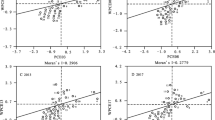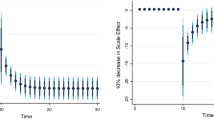Abstract
Fiscal decentralization is a topic of great importance, especially in the context of environmental sustainability. Numerous research studies have been conducted on fiscal decentralization providing conflicting results, and therefore, the current study fills the gap by examining the effect of fiscal decentralization on environmental quality in the presence of environment-related technological innovation, renewable energy consumption, international trade, and economic growth taking seven fiscally decentralized advanced OECD countries as a case study. Using data from 1990 to 2018, we employed the Spatial Durbin Model (SDM) to test the spatial spillover effect of fiscal decentralization on the environment in seven fiscally decentralized countries. The primary findings show that carbon emissions are affected by the associated regions, which significantly correlates with the spatial distribution, and in the short run, fiscal decentralization increases carbon emissions. However, in the long run, fiscal decentralization decreases carbon emissions and is essential for achieving the goals of net-zero carbon emission. The results also show that the indirect effect is significantly positive in the economic-geographical weight matrix, and the spatial spillover effect of fiscal decentralization is not conducive to the environment of countries with economic exchanges. Furthermore, fiscal decentralization has a threshold effect, and the results show that when the fiscal decentralization degree is higher, it significantly reduces CO2 emissions. Any policy in these countries that target renewable energy, fiscal decentralization, and eco-innovation will significantly reduce carbon emissions.


Similar content being viewed by others
References
Atasoy B (2017) Testing the environmental Kuznets curve hypothesis across the US: evidence from panel mean group estimators. Renew Sustain Energy Rev 77:731–747. https://doi.org/10.1016/j.rser.2017.04.050
Barrett S (2003) Environment and statecraft: the strategy of environmental treaty-making. OUP Oxford
Batterbury SP, Fernando JL (2006) Rescaling governance and the impacts of political and environmental decentralization: an introduction. World Dev 34:(11);1851-1863.
Blanchard O, Shleifer A (2001) Federalism with and without political centralization: China versus Russia. IMF Staff Pap 48:(1);171-179
Brennan G, Buchanan JM (1980) The power to tax: analytic foundations of a fiscal constitution. Cambridge University Press
Chen X, Chang CP (2020) Fiscal decentralization, environmental regulation, and pollution: a spatial investigation. Environ Sci Pollut Res 27:(25);31946-31968. https://doi.org/10.1007/s11356-020-09522-5
Chen X, Liu J (2020) Fiscal decentralization and environmental pollution: A spatial analysis. Discret Dyn Nat Soc. https://doi.org/10.1155/2020/9254150
Cheng S, Fan W, Chen J, Meng F, Liu G, Song M, and Yang Z (2020) The impact of fiscal decentralization on CO2 emissions in China. Energy 192:116685
Cheng Y, Awan U, Ahmad S, Tan Z (2021) How do technological innovation and fiscal decentralization affect the environment? A story of the fourth industrial revolution and sustainable growth. Technol Forecast Soc Chang 162:120398. https://doi.org/10.1016/j.techfore.2020.120398
Cutter WB, DeShazo JR (2007) The environmental consequences of decentralizing the decision to decentralize. J Environ Econ Manag 53:(1);32-53
Danish and Wang Z (2019) Does biomass energy consumption help to control environmental pollution? Evidence from BRICS countries. Sci Total Environ 670:(C); 1075–1083
Destek MA, Sarkodie SA (2019) Investigation of environmental Kuznets curve for ecological footprint: the role of energy and financial development. Sci Total Environ 650:2483-2489. https://doi.org/10.1016/j.scitotenv.2018.10.017
Diffenbaugh NS (2020) Verification of extreme event attribution: using out-of-sample observations to assess changes in probabilities of unprecedented events. Sci Adv 6:12–12. https://doi.org/10.1126/sciadv.aay2368
Du J, Sun Y (2021) The nonlinear impact of fiscal decentralization on carbon emissions: from the perspective of biased technological progress. Environ Sci Pollut Res 1–10. https://doi.org/10.1007/s11356-021-12833-w
ECIU (2020) ECIU countdown to net zero. London. Energy and climate intelligence unit report. https://eciu.net/analysis/reports/2019/countdown-to-zero. Accessed 22 Jan 2021
EDGAR (2019) Fossil CO2 and GHG emissions of all world countries. Luxembourg: Emission database for global atmospheric research. https://edgar.jrc.ec.europa.eu/overview.php?v=booklet2019. Accessed 5 Dec 2020
Elheddad M, Djellouli N, Tiwari AK, Hammoudeh S (2020) The relationship between energy consumption and fiscal decentralization and the importance of urbanization: evidence from Chinese provinces. J Environ Manag 264:110474. https://doi.org/10.1016/j.jenvman.2020.110474
Fell H, Kaffine DT (2014) Can decentralized planning really achieve first-best in the presence of environmental spillovers? J Environ Econ Manag 68:(1);46-53
Fredriksson PG, Svensson J (2003) Political instability, corruption and policy formation: the case of environmental policy. J Public Econ 87:(7–8);1383-1405
Gray WB, Shadbegian RJ (2004) ‘Optimal’ pollution abatement—whose benefits matter, and how much? J Environ Econ Manag 47:(3):510-534
Guo S, Wen L, Wu Y, Yue X, and Fan G (2020) Fiscal decentralization and local environmental pollution in China. Inter J Environ Res Public Health 17:(22);8661. https://doi.org/10.3390/IJERPH17228661
He Q (2015) Fiscal decentralization and environmental pollution: Evidence from Chinese panel data China. Econ Rev 36:86-100. https://doi.org/10.1016/J.CHIECO.2015.08.010
Khan Z, Ali S, Dong K, and Li RYM (2021) How does fiscal decentralization affect CO2 emissions? The roles of institutions and human capital. Energy Econ 94:105060
Kim DR (2011) Do local policy networks deter the race to the bottom in environmental regulation? The case of South Korea. Eviron Plann C Gov Policy 29:(6);1037-1053
Konisky DM (2007) Regulatory competition and environmental enforcement: is there a race to the bottom?. Am J Political Sci 51:(4);853-872
LeSage JP, Pace RK (2009) Introduction to spatial econometric CRC Press Taylor & Francis Group Boca Raton, US
LeSage JP, Pace RK (2014) The biggest myth in spatial econometrics. Econ 2:(4);217-249
Levinson A (2003) Environmental regulatory competition: a status report and some new evidence. Nat Tax J 91–106
Li H, Zhou LA (2005) Political turnover and economic performance: the incentive role of personnel control in China. J Public Econ 89:(9–10);1743-1762
Li L, Liu X, Ge J, Chu X, Wang J (2019) Regional differences in spatial spillover and hysteresis effects: a theoretical and empirical study of environmental regulations on haze pollution in China. J Clean Prod 230:1096-1110
Li Y (2019) The analysis on the influence of fiscal decentralization on carbon emission. DEStech Transact Comput Sci Eng 0(icaic). https://doi.org/10.12783/dtcse/icaic2019/29452
Liu L, Li L (2019) Effects of fiscal decentralization on the environment: new evidence from China. Environ Sci Pollut Res 26:(36);36878-36886
Millimet DL (2003) Assessing the empirical impact of environmental federalism. J Reg Sci 43:(4);711-733
Najaf I, Raza AK, Riazullah S, Wan G, Munir A, and Kai T (2021) Does exports diversification and environmental innovation achieve carbon neutrality target of OECD economies? J Environ Manag 291:112648
Oates WE (1999) An essay on fiscal federalism. J Econ Lit 37:(3);1120-1149
Peters GP, Minx JC, Weber CL, Edenhofer O (2011) Growth in emission transfers via international trade from 1990 to 2008. Proc Natl Acad Sci USA 108:(21);8903-8910
Potoski M (2001) Clean air federalism: Do states race to the bottom? Public Adm Rev 61:(3);335-343
Que W, Zhang Y, Liu S, Yang C (2018) The spatial effect of fiscal decentralization and factor market segmentation on environmental pollution. J Clean Prod 184:402-413
Sigman H (2007) Decentralization and environmental quality: An international analysis of water pollution
Sigman H (2014) Decentralization and environmental quality: An international analysis of water pollution levels and variation. Land Econ 90:(1);114-130
Stakhovych S, Bijmolt TH (2009) Specification of spatial models: a simulation study on weights matrices. Pap Reg Sci 88:(2);389-408
Styan GP (1973) Hadamard products and multivariate statistical analysis. Linear Algebra Appl 6:217-240
The-Phan C, Jain V, Purnomo EP, Islam MM, Mughal N, Guerrero JWG, Ullah S (2021) Controlling environmental pollution: dynamic role of fiscal decentralization in CO2 emission in Asian economies. Environ Sci Pollut Res 28:(46);65150-65159. https://doi.org/10.1007/S11356-021-15256-9/TABLES/4
Thiessen U (2003) Fiscal decentralization and economic growth in high-income OECD Countries. Fisc Stud 24:(3):237-274
Wang WZ, Liu LC, Liao H, and Wei YM (2021) Impacts of urbanization on carbon emissions: an empirical analysis from OECD countries. Energy Policy 151:112171
Yang Y, Tang D, Zhang P (2020) Effects of fiscal decentralization on carbon emissions in China. Int J Energy Sect Manage 14:(1);213-228. https://doi.org/10.1108/IJESM-03-2019-0001
Yang Y, Yang X, Tang D (2021) Environmental regulations, Chinese-style fiscal decentralization, and carbon emissions: from the perspective of moderating effect. Stoch Env Res Risk Assess 35:(10);1985-1998. https://doi.org/10.1007/S00477-021-01999-X/TABLES/6
Zhang K, Zhang ZY, Liang QM (2017) An empirical analysis of the green paradox in China: from the perspective of fiscal decentralization. Energy Policy 103:203-211
Zhang Y, Wang W, Liang L, Wang D, Cui X, and Wei W (2020) Spatial-temporal pattern evolution and driving factors of China’s energy efficiency under low-carbon economy. Sci Total Environ 739:140197
Zhang L, Yang L (2018) Impacts of trade liberalization on Chinese economy with Belt and Road initiative. Maritime Policy Manag 45:(3);301–318
Author information
Authors and Affiliations
Contributions
AS—conceptualization, data curation, project administration, writing—review and original draft preparation. QW—formal analysis, methodology, results, results interpretation, visualization, resources. SW—conceptualization, data curation, writing—review and editing.
Corresponding author
Ethics declarations
Ethical approval
N/A
Consent to participate
N/A
Consent for publictation
N/A
Competing interests
The authors have no competing interest.
Additional information
Responsible Editor: Eyup Dogan
Publisher's note
Springer Nature remains neutral with regard to jurisdictional claims in published maps and institutional affiliations.
Rights and permissions
About this article
Cite this article
Safi, A., Wang, QS. & Wahab, S. Revisiting the nexus between fiscal decentralization and environment: evidence from fiscally decentralized economies. Environ Sci Pollut Res 29, 58053–58064 (2022). https://doi.org/10.1007/s11356-022-19860-1
Received:
Accepted:
Published:
Issue Date:
DOI: https://doi.org/10.1007/s11356-022-19860-1




